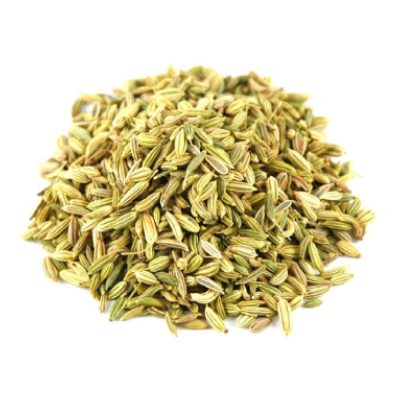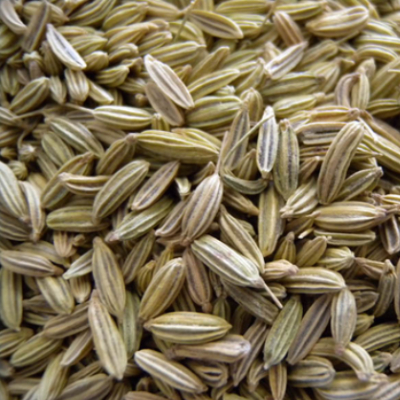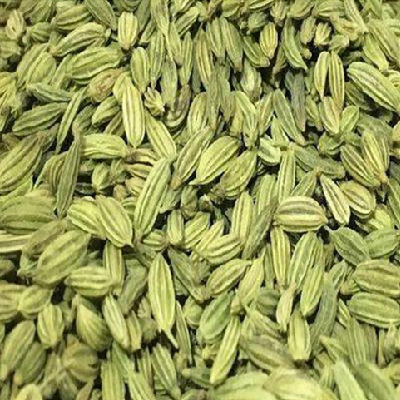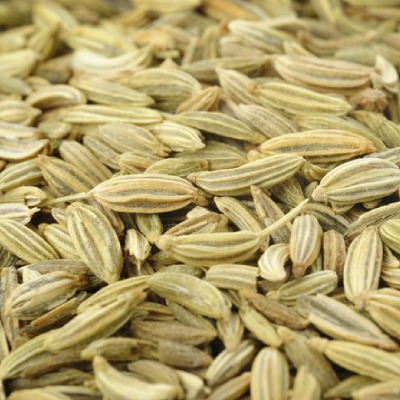FENNEL seeds

Fennel seeds are defined as the dried yellowish brown schizocarpic fruits that are obtained from the plant of fennel, a perennial herb in the genus ‘Foeniculum’. These seeds are about 10 cm long and about 4 mm wide. They have a sweet and aromatic flavour and emit a pleasant odour. In India, fennel seeds are available in yellow and green colour. While the green coloured fennel seeds (saunf) are chewed as a mouth freshener, the yellow variety is used for cooking purposes.
Fennel seeds are a rich source of minerals like potassium, manganese, magnesium, etc. There are two main constituents of fennel seeds, namely, Anethol and Fenchone. Anethol helps in controlling muscle spasms in the intestinal tract and Fenchone comprises of many medicinal properties.
ETYMOLOGY OF FENNEL seeds
The term ‘fennel’ has been derived from ‘fenel’ or ‘fenyl’, a Middle English term, which was in turn developed from the term ‘fenol’ or ‘finol’.
In different nations, the fennel seeds are known by different names. For eg., in Germany, it is known as German Fenchel, while in Italy, they are known as Italian finocchio. The Latin word for the fennel plant is known as ‘ferula’.

HISTORY OF FENNEL seeds
Fennel was a very well known plant and was much respected by the ancient Greeks and Romans. During the Middle Age, it was used in amulets as a measure of protection against witchcraft. According
to the Puritans, the fennel seeds were their ‘meeting seeds’ and thus they chewed these seeds during their long church services.
As per an ancient legend, fennel was awarded to Pheidippides, the hero of Ancient Greece, who informed the news of Persian invasion to Sparta by running all the way from the battlefield of Marathon to Athens, covering a journey of 40 kms.
USES OF Fennel Seeds

In culinary terms, fennel seeds are a very crucial ingredient in many seasoning blends of Italy, China, Scandinavia, etc. They are a commonly used ingredient in the Italian sausages and also in rye balls and meat breads.
In India, they have acquired a special significance as they are used in in many Indian cuisines like the Bengali or the Oriya mixture ‘panch phoron‘. Roasted fennel seeds are consumed after a heavy meal as they help in the proper digestion of the food.
BENEFITS OF FENNEL seeds
Fennel seeds come with a vast set of health benefits, and their medicinal properties were acclaimed
far and wide before they came to be used as herbs. One of the major benefits of fennel seeds is that they help in strengthening the eyes. In fact, according to the Roman naturalists, the snakes, after casting off their skins, ate fennel to restore their eye sight.
Fennel seeds are also rich in Vitamin C, a vital source that helps in strengthening the immune system. They also help overcome indigestion and digestive disorders like gas, acidity, cramps, etc. The presence of Anethol in the fennel seeds helps to fight against cancer and indigestion.

A SAFETY NOTE
Although high on medicinal properties, it is recommended that pregnant women avoid consuming mixtures that contain fennel seeds. Also, the oil from the fennel plant is quite volatile and can cause dermatitis if the skin comes in direct contact with the oil. Thus, people with sensitive skin should avoid consuming this oil.

